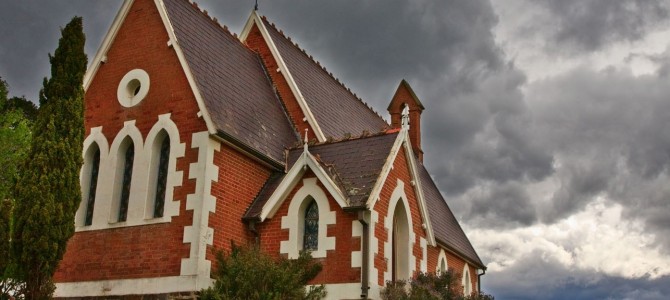
Insofar as belief is concerned, I have sampled all the major options. I have been a believer, I have been an atheist, I have been an obnoxious atheist, I have been an agnostic. Now, I am back to believer. I must admit my path back from agnosticism to Christianity was not driven by pure motivations. See, I have three daughters and the wife thought they should start going to church. I channeled Tocqueville and agreed with her on that point. I have positive memories of church from childhood and knew it to be a beneficial institution. My agnosticism was not born of anything negative. But I had an ulterior motive. I was a cynic. I thought, “I’ll likely get downsized at some point or another and it would be good to have some more connections in the community. I might establish some solid connections by going to church.”
The wife wanted to give the Episcopal Church down the way a shot as she is in Rotary with the priest. I was raised a Presbyterian, but attended an Episcopal school from kindergarten through sixth grade, so it was familiar turf. So off we went. I thoroughly enjoyed the service and meeting people, though I was still in the agnostic camp after that first Sunday. Regardless, we continued to go. Whereas you have the often insufferable “spiritual but not religious” types, I was off in another camp – religious but not spiritual. I was not a Unitarian, though I will admit I flirted with that nonsense in my atheist days. Thankfully, I never crossed fully into that dark territory.
No, I was something else — a utilitarian. I was getting up on Sunday mornings for purely selfish and practical reasons. And though it sounds horrible, it was not. As churches have become less enmeshed in the community, less a thread keeping various generations and groups connected, we have come to think of them only in spiritual terms. Of places we go to get affirmation or reflect a bit or to say a prayer of repentance or to ingest the sacraments and inoculate ourselves for another 7 days.
When discussing the primary function of the church — at a primordial level — utilitarianism is well and good. It is not controversial to assert that churches were once cornerstones, important foundations for their respective local communities. Alas, that position now veers towards heresy. Churches do not exist to provide tangential benefits, but ephemeral ones. Moreover, to ignore how utility, and not ephemera, brought a heathen such as myself back into the fold, as well as however many other fellow travelers, is folly. Churches need to embrace their utilitarianism.
Before we go any further, we do have to address one point. Yes, I am one of those wacky Episcopalians. And, yes, despite protestations to the contrary, the Episcopal Church seems to be in decline. But was it over when the Germans bombed Pearl Harbor? Hell, no! (Forget it. He’s rolling. – Ed.) But that is not why we are here. Bear with me. This is not going to go where you think it is going despite that admission; one which, in conservative circles, is tantamount to standing up in a support group and saying, “Hi. I’m Rich and I’m an Episcopalian.”
Rather, we are here because I did get downsized. It was a few years later than expected and came at a wholly unexpected time. (Leadership talked about the new strategy. I suppose throwing things at a wall to see what sticks is technically a strategy, but I would not recommend it if I were hired as a consultant.)
I began attending church because I expected the imminent. Alas, the imminent was busy buffering and I allowed myself to be lulled into torpor. It was a fortuitous torpor. I will explicate later. First, there are more quantitative matters to be addressed.
One can approach unemployment in a variety of ways. One can get caught in one of the various stages of grief. Or one can be somewhat clichéd and say, “I am not unemployed. My current job is finding a new job.” You can find me in the latter camp.
I spend my days searching job boards, writing cover letters, and applying, applying, applying. As I have three kids, unemployment is not a state in which I can lounge. Though I love my kids, I have come to learn that, as a father, I mostly love them from a distance. I need to be away, being a provider, forgetting they are ravenous demons.
Another cliché is that it is not what you know, but who you know. Want to explore why that is a cliché? I can explain it in four words – because it is true. So as I apply, apply, apply, I reach out to my connections. “Do you know the hiring manager for this position?” “Can you push my résumé?”
The most encouraging responses to those questions have come from members of my congregation. Beyond that, I received an unsolicited email from a stranger with a very fancy title asking me if I had time for lunch; to meet and discuss my skills and interests. Why did this man with a fancy title contact me? A friend from church shared my résumé with him.
So there it is. All you nonbelievers and wafflers, now you have a reason to get up on Sunday mornings. It might, perhaps, maybe help you get a job if you are expectedly downsized at an unexpected time. Church – it’s really all about you. Get on it.
Hold on a minute.
The path forward is rarely straight. Mine was not an exception to this truth.
See, though I started attending church for utilitarian reasons, I also silenced my ego enough to admit that I am not that smart. As such, I realized I needed to be open to the possibility that maybe I do not have everything figured out. That maybe saying the “Big Bang” and “natural selection” were not arguments against a creator, but just some things to say.
That is, the Big Bang and natural selection do not inherently undercut the argument for God. They can, in fact, bolster it. As C.S. Lewis deftly noted:
Nature means to us whatever we please as the moods select and slur. But everything becomes different when we recognise that Nature is a creature, a created thing, with its own particular tang or flavour. There is no need any longer to select and slur. It is not in her, but in Something far beyond her, that all lines meet and all contrasts are explained.
Perhaps God and natural selection are not enemies after all. Perhaps they are not even frenemies. Perhaps they are in cahoots! Oh man, I had some soul searching to do. Wait, soul? What? Things were getting too complicated. It was time to put the whole lie to bed and give in, so I decided I would pray. Seriously. Intently.
And I prayed.
And, damn it, it worked.
One cloudy Sunday morning I finished what had become my traditional “Let me have faith prayer,” raised my head, and opened my eyes. At that moment, the sun emerged from behind the clouds but for a moment and came pouring across the altar, through the stained glass. Then and there, I rediscovered my faith. I had been looking for grand gestures and ignoring the sunlight, the sunlight which had always been right in front of me. Man, providence. Back to Lewis:
That which I greatly feared had at last come upon me. In the Trinity Term of 1929 I gave in, and admitted that God was God, and knelt and prayed: perhaps, that night, the most dejected and reluctant convert in all England.
Generally, the acceptance of Christ is treated more ebulliently. Personally, I identify with Lewis. Though it was a joyous moment, it was also a moment of dejection and reluctance. I had sacrificed enough ego to entertain the possibility; I had not sacrificed enough to truly accept that I had been wrong. And though the sunlight streamed in, I also had to grapple with the fact that I was now bound by more than my logic.
Worse still, logic brought me to that point. What started as a completely rational and utilitarian impulse had left me wallowing in mysticism. I was transfigured from intellectual skeptic to foolish rube. How did this happen?
Being a conservative Episcopalian is difficult. Every Sunday, I have to think. I have to be prepared to challenge and defend my conceptions. I am rarely, if ever, affirmed. Instead, I must defend myself like a student earning a particularly difficult JD. I went in a utilitarian. Now I find myself a Socratic defender. And that is utilitarian.
See, by not being blindly affirmed, I am forced to think through my positions. To develop. To challenge. To put forth substantive arguments. Whereas my spiritual but not religious friends are self-congregating into echo chambers, I am howling into the wind.
I am also brushing against multiple generations and multiple career levels.
So I am getting history. I am getting practical advice. And my reference page is impressive.
Back when church was just part of the community, one which did not have to be explained, such truths were unremarkable. Yeah, dude, you go to church, now tell me something I don’t know. Except most people do not go to church anymore.
Hmmm. Obviously the answer is to be more tolerant, more spiritual but not religious, more caught up in the ephemera. Except for the data that suggests the opposite.
The data ignores the truth that churches were once a cornerstone. The survey linked above assumes an “in it but not of it” attitude that is not productive. Church can be in it, not of it, but still really of it. It can be a sanctuary while also being a place where one networks and gets a solid referral for a new job.
See, our ecosystems – all our ecosystems – are of the natural world. And in something far beyond her all lines meet and all contours are explained. Where we live, where we eat, where we work, where we play, where we congregate, where we find ingroups – these are our ecosystems, our natural habitat. And though that habitat is transcendent, it is also terrestrial. It is transactional and topical. It is humdrum. It is challenging. It is integral to our literal, and not transubstantiated, daily bread. But it is a platform from which we can leap into eternity.
And there is where churches can eclipse the current trend toward spirituality and embrace utility. Nature, the full ecosystem, those lines and contours, are tangible, not ephemeral. Embrace the tangible benefits. The immutable benefits will organically follow. As Tocqueville wrote:
But while man takes delight in this honest and lawful pursuit of his own well-being, it is to be apprehended that in the end he may lose the use of his sublimest faculties, and that while he is busied in improving all around him, he may at length degrade himself. Here, and here only, does the peril lie. It should therefore be the unceasing object of the legislators of democracies and of all the virtuous and enlightened men who live there to raise the souls of their fellow citizens and keep them lifted up towards heaven.
Yup. The path is ephemeral even as the goal is everlasting. But to reach both the ephemeral and the everlasting, the transitory angles must be nurtured, given space in which to grow. They must be presented with obstacles and grace. Only then can the permanent – the spiritual – fruits be realized.









